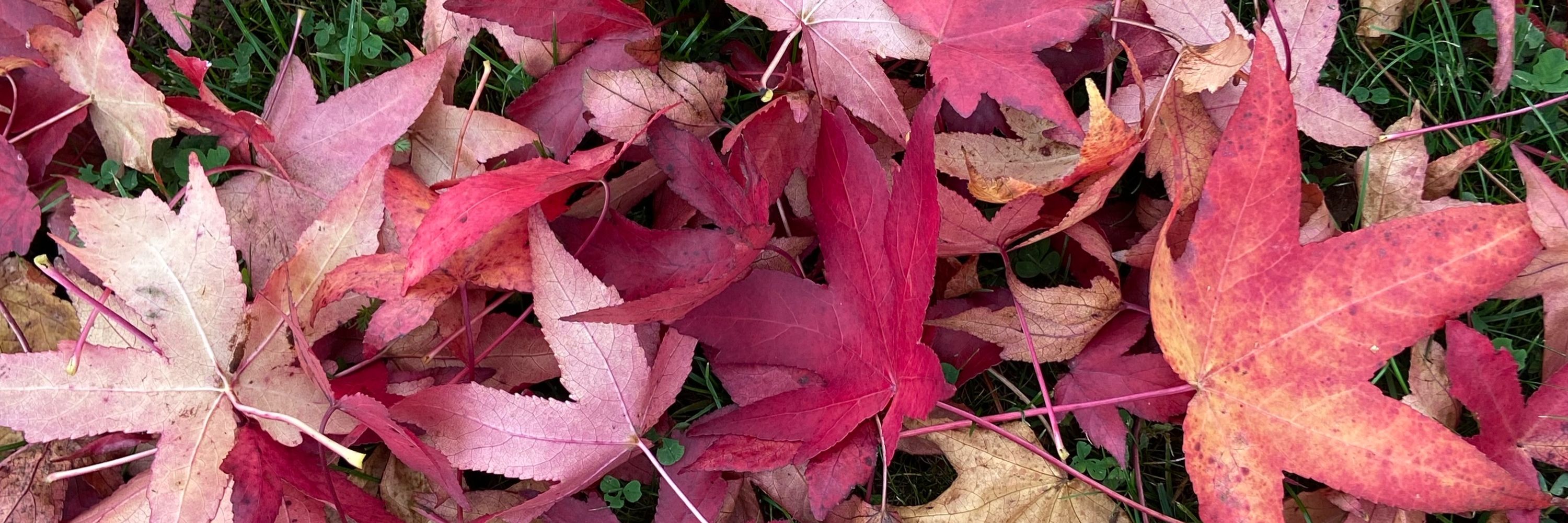
Kiran R. Patil
@kiranrpatil.bsky.social
Professor of Molecular Systems Biology, University of Cambridge
Reposted by Kiran R. Patil
Sub-cellular chemical mapping in bacteria using correlated cryogenic electron and mass spectrometry imaging
Congrats Hannah Ochner and authors on this important paper! Strong collaboration with @kiranrpatil.bsky.social
www.biorxiv.org/cgi/content/...
@mrclmb.bsky.social @wellcometrust.bsky.social
Congrats Hannah Ochner and authors on this important paper! Strong collaboration with @kiranrpatil.bsky.social
www.biorxiv.org/cgi/content/...
@mrclmb.bsky.social @wellcometrust.bsky.social

August 31, 2025 at 6:44 PM
Sub-cellular chemical mapping in bacteria using correlated cryogenic electron and mass spectrometry imaging
Congrats Hannah Ochner and authors on this important paper! Strong collaboration with @kiranrpatil.bsky.social
www.biorxiv.org/cgi/content/...
@mrclmb.bsky.social @wellcometrust.bsky.social
Congrats Hannah Ochner and authors on this important paper! Strong collaboration with @kiranrpatil.bsky.social
www.biorxiv.org/cgi/content/...
@mrclmb.bsky.social @wellcometrust.bsky.social
Another fantastic study from @lisamaierlab.bsky.social showing how non-antibiotics impact gut ecosytem. Congratulations @ghammeranne.bsky.social et al.!
Seeing this published is even better than eating sweets! I am so happy and proud of whole @lisamaierlab.bsky.social, especially Lisa and @jdlcz.bsky.social who walked the funny/exciting/rocky road with me until the very end. Check it out!
#science #microbiome #health
www.nature.com/articles/s41...
#science #microbiome #health
www.nature.com/articles/s41...
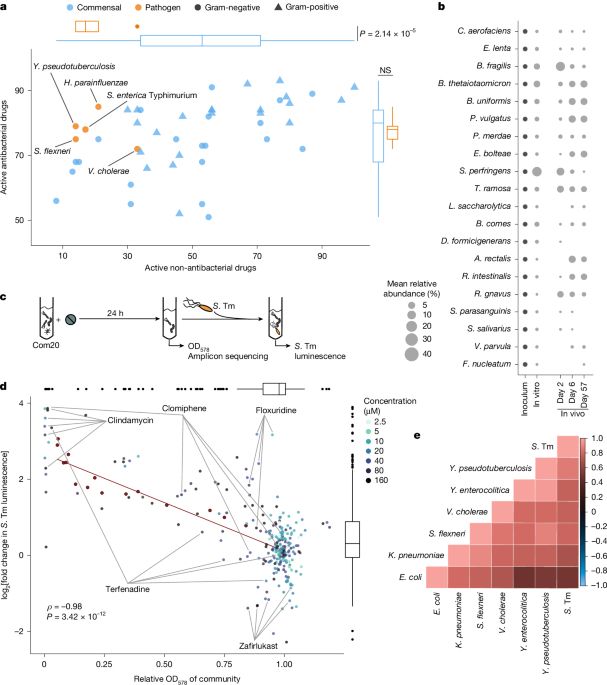
Non-antibiotics disrupt colonization resistance against enteropathogens - Nature
Non-antibiotic drugs from a wide range of therapeutic classes can alter the ability of gut commensals to resist invasion by enteropathogens, a previously underappreciated side effect of such drugs.
www.nature.com
July 17, 2025 at 12:23 PM
Another fantastic study from @lisamaierlab.bsky.social showing how non-antibiotics impact gut ecosytem. Congratulations @ghammeranne.bsky.social et al.!
Reposted by Kiran R. Patil
@skamrad.bsky.social @kiranrpatil.bsky.social show xenobiotics impact growth of gut bacteria and their metabolic homeostasis by affecting amine metabolism ➡️ www.embopress.org/doi/full/10....
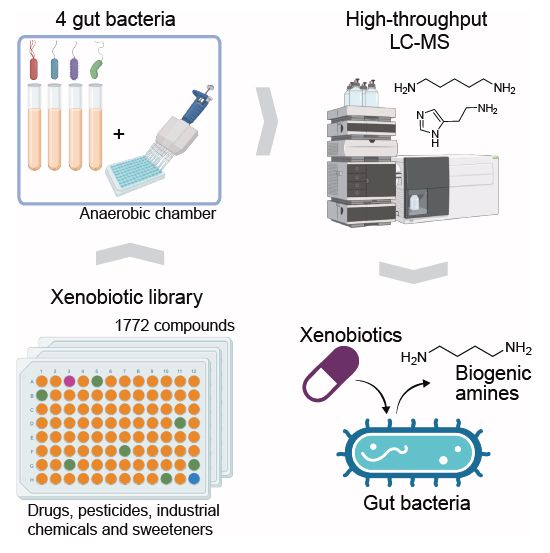
July 3, 2025 at 12:44 PM
@skamrad.bsky.social @kiranrpatil.bsky.social show xenobiotics impact growth of gut bacteria and their metabolic homeostasis by affecting amine metabolism ➡️ www.embopress.org/doi/full/10....
Reposted by Kiran R. Patil
Scientists discover protection from PFAS chemicals
#Cambridgeshire #BBCNews
🔗: https://www.bbc.com/news/arti...
#Cambridgeshire #BBCNews
🔗: https://www.bbc.com/news/arti...

Scientists' discovery could help protect against PFAS chemicals
Cambridge University scientists say a certain species of microbe in the human gut can absorb PFAS.
www.bbc.com
July 1, 2025 at 10:49 AM
Scientists discover protection from PFAS chemicals
#Cambridgeshire #BBCNews
🔗: https://www.bbc.com/news/arti...
#Cambridgeshire #BBCNews
🔗: https://www.bbc.com/news/arti...
Excited to share some key details on our latest research in @natmicrobiol.nature.com reporting intra-cellular accumulation of #PFAS (aka forever chemicals) by certain human gut bacteria. #microsky #mevosky #microbiomesky
www.nature.com/articles/s41...
www.nature.com/articles/s41...
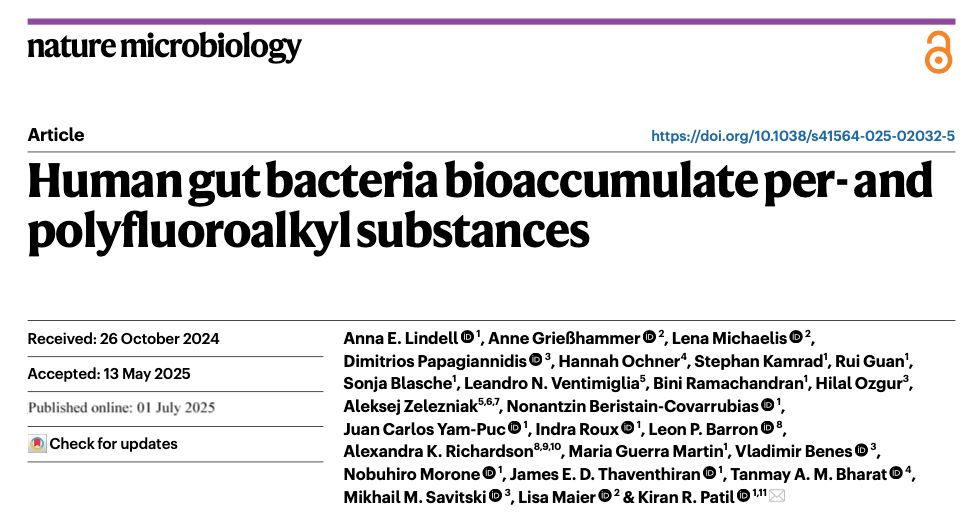
July 2, 2025 at 2:57 PM
Excited to share some key details on our latest research in @natmicrobiol.nature.com reporting intra-cellular accumulation of #PFAS (aka forever chemicals) by certain human gut bacteria. #microsky #mevosky #microbiomesky
www.nature.com/articles/s41...
www.nature.com/articles/s41...
Reposted by Kiran R. Patil
#NewResearch
🚨Out now!
Human gut bacteria bioaccumulate forever chemicals, in intracellular aggregates and colonization of gnotobiotic mice with these bioaccumulating bacteria increases faecal PFAS excretion. @kiranrpatil.bsky.social
#MicroSky #MicrobiomeSky 🦠
www.nature.com/articles/s41...
🚨Out now!
Human gut bacteria bioaccumulate forever chemicals, in intracellular aggregates and colonization of gnotobiotic mice with these bioaccumulating bacteria increases faecal PFAS excretion. @kiranrpatil.bsky.social
#MicroSky #MicrobiomeSky 🦠
www.nature.com/articles/s41...
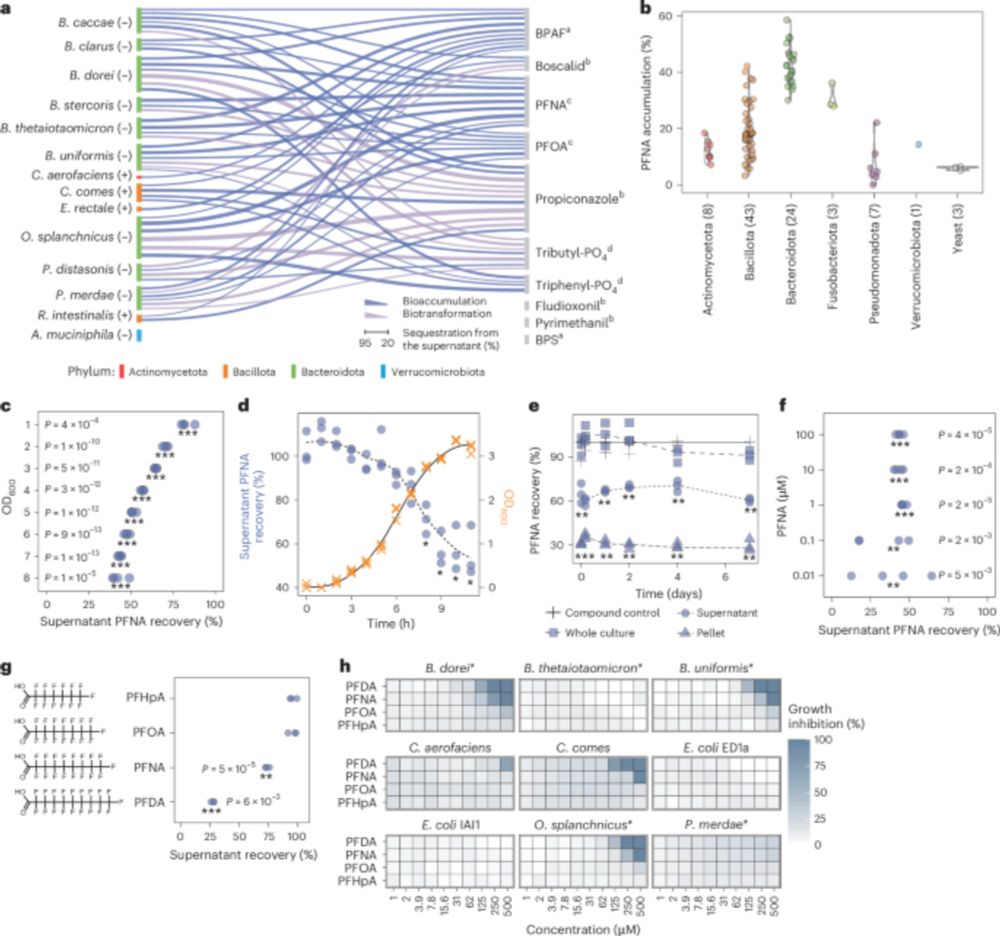
Human gut bacteria bioaccumulate per- and polyfluoroalkyl substances - Nature Microbiology
Human gut bacteria bioaccumulate per- and polyfluoroalkyl substances (PFAS), commonly known as forever chemicals, in intracellular aggregates. Colonization of gnotobiotic mice with bioaccumulating bac...
www.nature.com
July 1, 2025 at 3:18 PM
#NewResearch
🚨Out now!
Human gut bacteria bioaccumulate forever chemicals, in intracellular aggregates and colonization of gnotobiotic mice with these bioaccumulating bacteria increases faecal PFAS excretion. @kiranrpatil.bsky.social
#MicroSky #MicrobiomeSky 🦠
www.nature.com/articles/s41...
🚨Out now!
Human gut bacteria bioaccumulate forever chemicals, in intracellular aggregates and colonization of gnotobiotic mice with these bioaccumulating bacteria increases faecal PFAS excretion. @kiranrpatil.bsky.social
#MicroSky #MicrobiomeSky 🦠
www.nature.com/articles/s41...
Reposted by Kiran R. Patil
Beautiful work from my friend @kiranrpatil.bsky.social . Gut bacteria can accumulate Forever chemicals and help us get rid of them! Happy we could contribute! www.nature.com/articles/s41...
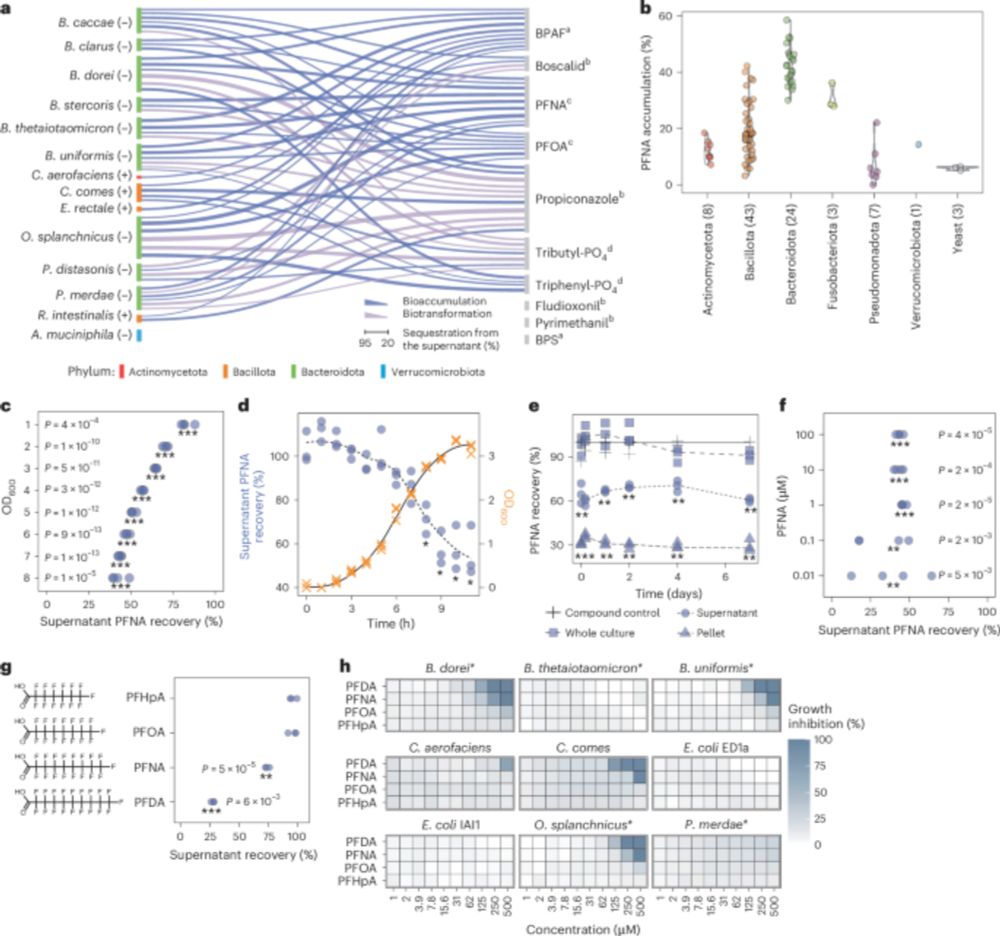
Human gut bacteria bioaccumulate per- and polyfluoroalkyl substances - Nature Microbiology
Human gut bacteria bioaccumulate per- and polyfluoroalkyl substances (PFAS), commonly known as forever chemicals, in intracellular aggregates. Colonization of gnotobiotic mice with bioaccumulating bac...
www.nature.com
July 1, 2025 at 11:25 AM
Beautiful work from my friend @kiranrpatil.bsky.social . Gut bacteria can accumulate Forever chemicals and help us get rid of them! Happy we could contribute! www.nature.com/articles/s41...
Reposted by Kiran R. Patil
Gut bacteria to the rescue! 🦠✨
They can shield us from harmful chemicals—and the latest study from Kiran Patil's lab (@kiranrpatil.bsky.social)
uncovers how. We’re proud to have contributed to this exciting work!
#Microbiome #Detox
www.nature.com/articles/s41...
They can shield us from harmful chemicals—and the latest study from Kiran Patil's lab (@kiranrpatil.bsky.social)
uncovers how. We’re proud to have contributed to this exciting work!
#Microbiome #Detox
www.nature.com/articles/s41...
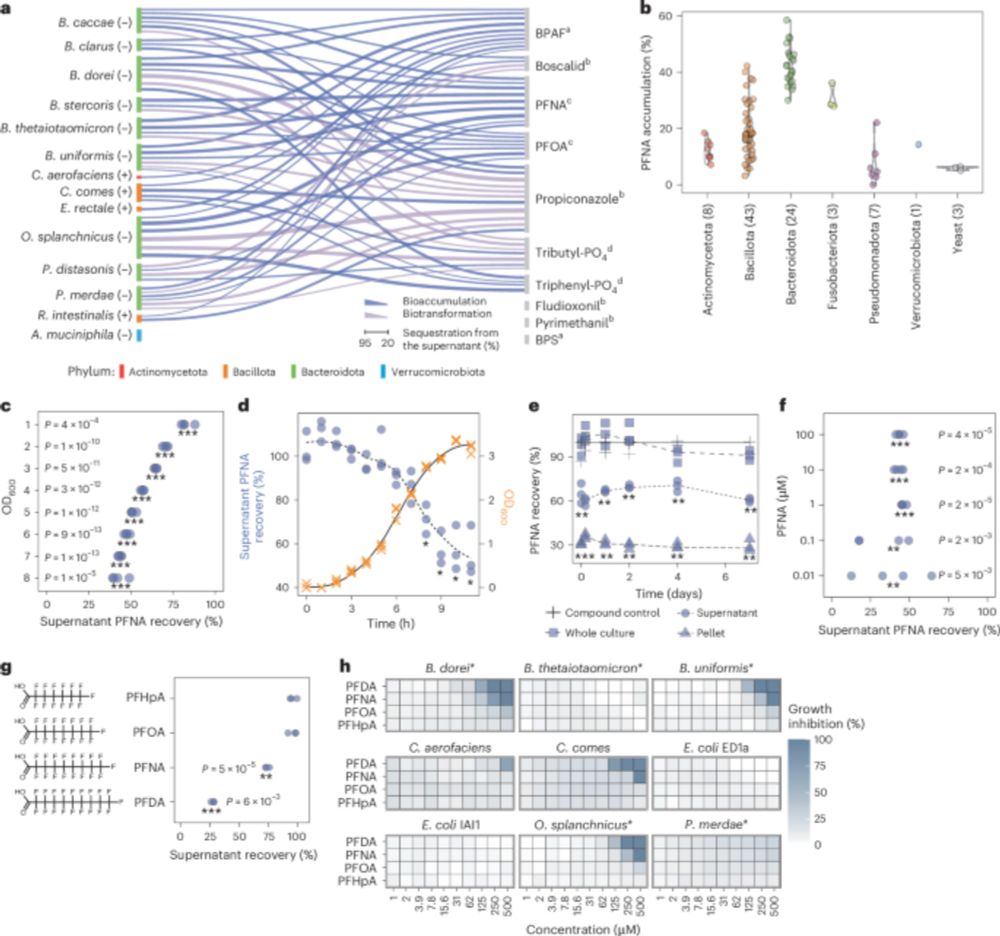
Human gut bacteria bioaccumulate per- and polyfluoroalkyl substances - Nature Microbiology
Human gut bacteria bioaccumulate per- and polyfluoroalkyl substances (PFAS), commonly known as forever chemicals, in intracellular aggregates. Colonization of gnotobiotic mice with bioaccumulating bac...
www.nature.com
July 1, 2025 at 10:03 AM
Gut bacteria to the rescue! 🦠✨
They can shield us from harmful chemicals—and the latest study from Kiran Patil's lab (@kiranrpatil.bsky.social)
uncovers how. We’re proud to have contributed to this exciting work!
#Microbiome #Detox
www.nature.com/articles/s41...
They can shield us from harmful chemicals—and the latest study from Kiran Patil's lab (@kiranrpatil.bsky.social)
uncovers how. We’re proud to have contributed to this exciting work!
#Microbiome #Detox
www.nature.com/articles/s41...
Reposted by Kiran R. Patil
Researchers in the Patil Lab have discovered that certain species of gut bacteria can absorb PFAS. Boosting these species in our gut microbiome could be a new way to protect us from the harmful effects of PFAS.
Read more here: buff.ly/4FsVFsS
@kiranrpatil.bsky.social @indraroux.bsky.social
Read more here: buff.ly/4FsVFsS
@kiranrpatil.bsky.social @indraroux.bsky.social
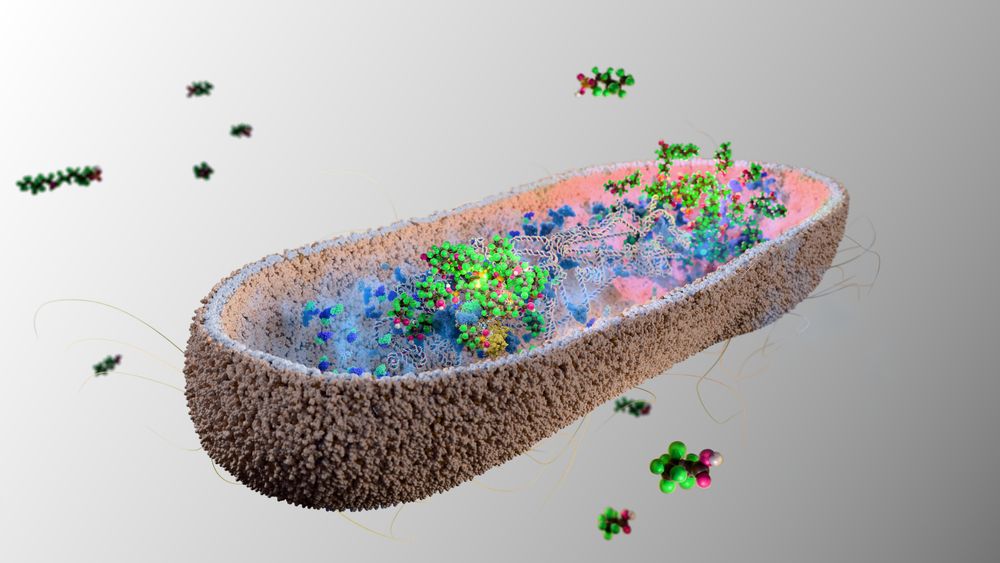
July 1, 2025 at 9:02 AM
Researchers in the Patil Lab have discovered that certain species of gut bacteria can absorb PFAS. Boosting these species in our gut microbiome could be a new way to protect us from the harmful effects of PFAS.
Read more here: buff.ly/4FsVFsS
@kiranrpatil.bsky.social @indraroux.bsky.social
Read more here: buff.ly/4FsVFsS
@kiranrpatil.bsky.social @indraroux.bsky.social
Latest study from the lab is online today (and another will be out tomorrow, stay tuned:)). We profiled effect of >1700 chemicals (drugs, pesticides,...) on secretion of amines (involved in gut-brain and gut-immune axis. ) by human gut bacteria. Brilliant work by @skamrad.bsky.social and Tara Davis
Stephan Kamrad and Tara Davis in the Patil lab at the MRC Toxicology Unit have identified that some drugs and environmental contaminants alter gut bacterial amine metabolism.
Find out more here: buff.ly/5akzsgs
@kiranrpatil.bsky.social @skamrad.bsky.social
Find out more here: buff.ly/5akzsgs
@kiranrpatil.bsky.social @skamrad.bsky.social
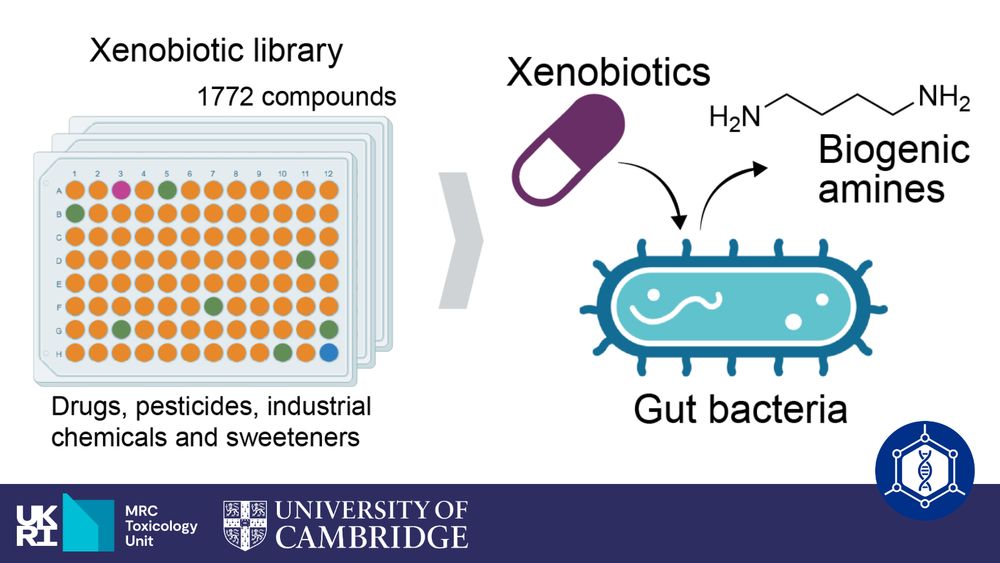
June 30, 2025 at 6:44 PM
Latest study from the lab is online today (and another will be out tomorrow, stay tuned:)). We profiled effect of >1700 chemicals (drugs, pesticides,...) on secretion of amines (involved in gut-brain and gut-immune axis. ) by human gut bacteria. Brilliant work by @skamrad.bsky.social and Tara Davis
Reposted by Kiran R. Patil
Check out our new preprint!
We systematically map proteomic and metabolomic interactions between >100 pairs of gut bacteria, detecting metabolic interactions and functionally-related clusters of proteins.
www.biorxiv.org/content/10.1...
@kiranrpatil.bsky.social
We systematically map proteomic and metabolomic interactions between >100 pairs of gut bacteria, detecting metabolic interactions and functionally-related clusters of proteins.
www.biorxiv.org/content/10.1...
@kiranrpatil.bsky.social

Interspecies interactions drive bacterial proteome reorganisation and emergent metabolism
Species in microbial communities must respond to the presence of others to stave off resource competition or to capitalise on new resources that may become available due to additional metabolic activi...
www.biorxiv.org
May 15, 2025 at 10:13 AM
Check out our new preprint!
We systematically map proteomic and metabolomic interactions between >100 pairs of gut bacteria, detecting metabolic interactions and functionally-related clusters of proteins.
www.biorxiv.org/content/10.1...
@kiranrpatil.bsky.social
We systematically map proteomic and metabolomic interactions between >100 pairs of gut bacteria, detecting metabolic interactions and functionally-related clusters of proteins.
www.biorxiv.org/content/10.1...
@kiranrpatil.bsky.social
Reposted by Kiran R. Patil
📢 Fresh off the press and featuring new exciting experiments! 🧪
We show how glycolytic activity instructs germ layer proportions through regulation of Nodal and Wnt signaling - happy to finally share this 😊
doi.org/10.1016/j.st...
B2B with @jesseveenvliet.bsky.social lab: doi.org/10.1016/j.st... 🤩
We show how glycolytic activity instructs germ layer proportions through regulation of Nodal and Wnt signaling - happy to finally share this 😊
doi.org/10.1016/j.st...
B2B with @jesseveenvliet.bsky.social lab: doi.org/10.1016/j.st... 🤩

April 16, 2025 at 5:40 PM
📢 Fresh off the press and featuring new exciting experiments! 🧪
We show how glycolytic activity instructs germ layer proportions through regulation of Nodal and Wnt signaling - happy to finally share this 😊
doi.org/10.1016/j.st...
B2B with @jesseveenvliet.bsky.social lab: doi.org/10.1016/j.st... 🤩
We show how glycolytic activity instructs germ layer proportions through regulation of Nodal and Wnt signaling - happy to finally share this 😊
doi.org/10.1016/j.st...
B2B with @jesseveenvliet.bsky.social lab: doi.org/10.1016/j.st... 🤩
Sweeteners are so common in food and drinks. New work expanding our knowledge base of sweetener-bacteria interactions 👇🏽. Kudos to @sonjablasche.bsky.social @indraroux.bsky.social and others from our lab
April 5, 2025 at 7:47 AM
Sweeteners are so common in food and drinks. New work expanding our knowledge base of sweetener-bacteria interactions 👇🏽. Kudos to @sonjablasche.bsky.social @indraroux.bsky.social and others from our lab
Kudos to Ghada @kostchristian.bsky.social team and @metagenomez.bsky.social et al. for this mammoth effort! An important step forward towards understanding natural microbial communities and determinants of their fascinating diversity.
New paper from my group and the group of
@kiranrpatil.bsky.social:
Obligate cross-feeding of metabolites is common in soil microbial communities
By Ghada Yousif @metagenomez.bsky.social with @swagatika.bsky.social @isamirgiri.bsky.social Sharvari Harshe et al.
www.biorxiv.org/content/10.1...
🧵👇
@kiranrpatil.bsky.social:
Obligate cross-feeding of metabolites is common in soil microbial communities
By Ghada Yousif @metagenomez.bsky.social with @swagatika.bsky.social @isamirgiri.bsky.social Sharvari Harshe et al.
www.biorxiv.org/content/10.1...
🧵👇
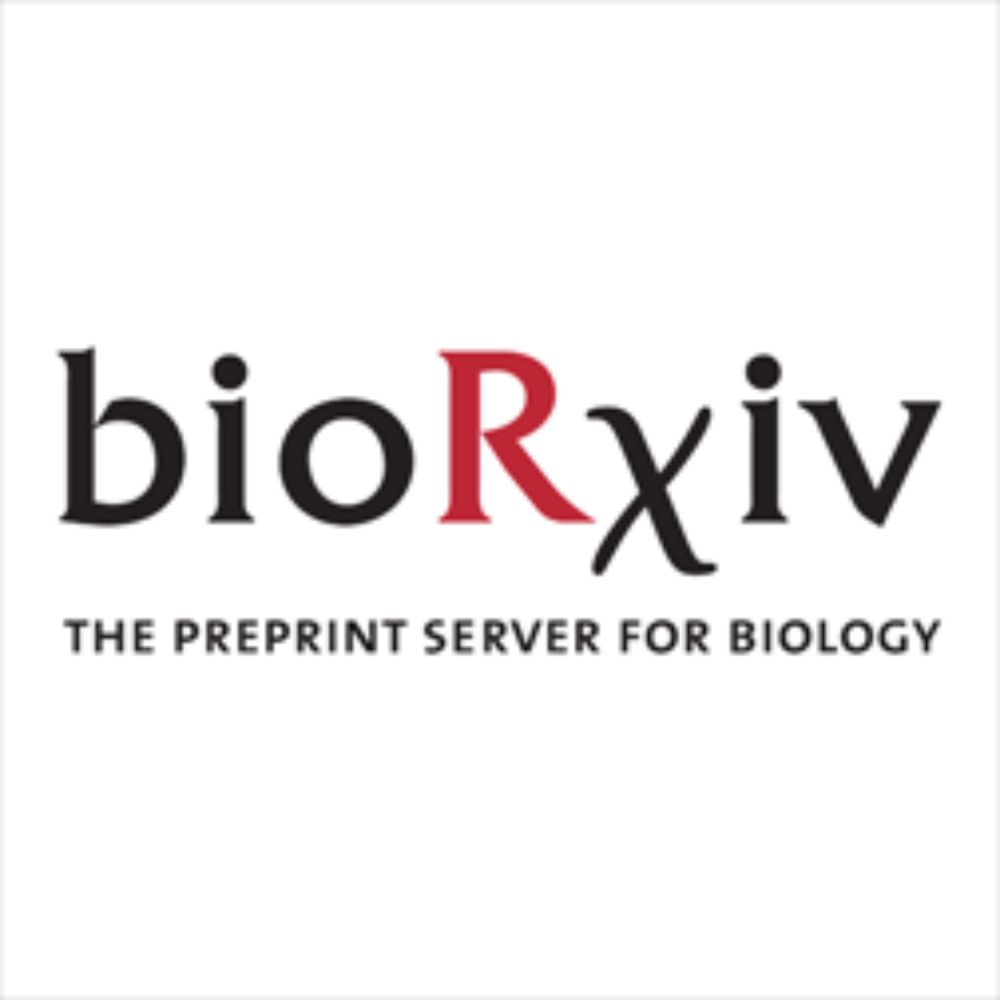
Obligate cross-feeding of metabolites is common in soil microbial communities
Many microorganisms are refractory to laboratory cultivation. One possible explanation, known as the great plate count anomaly, is metabolic dependencies among community members. However, systematic s...
www.biorxiv.org
January 31, 2025 at 9:18 AM
Kudos to Ghada @kostchristian.bsky.social team and @metagenomez.bsky.social et al. for this mammoth effort! An important step forward towards understanding natural microbial communities and determinants of their fascinating diversity.
Congratulations to talented @naomiirisvdberg.bsky.social for successfully passing her PhD exam! Very proud of the latest PhD graduate from my lab and the entire team! 🙌🎉🍾

January 27, 2025 at 11:31 AM
Congratulations to talented @naomiirisvdberg.bsky.social for successfully passing her PhD exam! Very proud of the latest PhD graduate from my lab and the entire team! 🙌🎉🍾
Reposted by Kiran R. Patil
Looking for a postdoctoral fellowship? Interested in tackling real-world challenges? Then check EMBL's EIPOD-LinC fellowships.
👉 Gain transferable skills and work on self-designed projects to make a lasting impact on global issues.
✍️ More information: www.embl.org/about/info/p...
🧪 #careers
👉 Gain transferable skills and work on self-designed projects to make a lasting impact on global issues.
✍️ More information: www.embl.org/about/info/p...
🧪 #careers

January 13, 2025 at 3:51 PM
Looking for a postdoctoral fellowship? Interested in tackling real-world challenges? Then check EMBL's EIPOD-LinC fellowships.
👉 Gain transferable skills and work on self-designed projects to make a lasting impact on global issues.
✍️ More information: www.embl.org/about/info/p...
🧪 #careers
👉 Gain transferable skills and work on self-designed projects to make a lasting impact on global issues.
✍️ More information: www.embl.org/about/info/p...
🧪 #careers
“Manufactured Chemicals and Children’s Health..” – an excellent evidence-based case in N Eng J Med. Despite overwhelming epidemiological evidence (Note: randomised clinical trials are obviously unethical), less than 20% chemicals are tested for toxicity.
www.nejm.org/doi/full/10....
www.nejm.org/doi/full/10....

January 13, 2025 at 9:19 AM
“Manufactured Chemicals and Children’s Health..” – an excellent evidence-based case in N Eng J Med. Despite overwhelming epidemiological evidence (Note: randomised clinical trials are obviously unethical), less than 20% chemicals are tested for toxicity.
www.nejm.org/doi/full/10....
www.nejm.org/doi/full/10....
Reposted by Kiran R. Patil
Interested in the ecological dynamics of Enterobacteriaceae across populations? Check out our new study 🧬
Delighted to share the first peer-reviewed paper from our team @camvetschool.bsky.social where we investigate the ecological dynamics of Enterobacteriaceae in the human gut #microbiome: www.nature.com/articles/s41... @naturemicrobiol.bsky.social
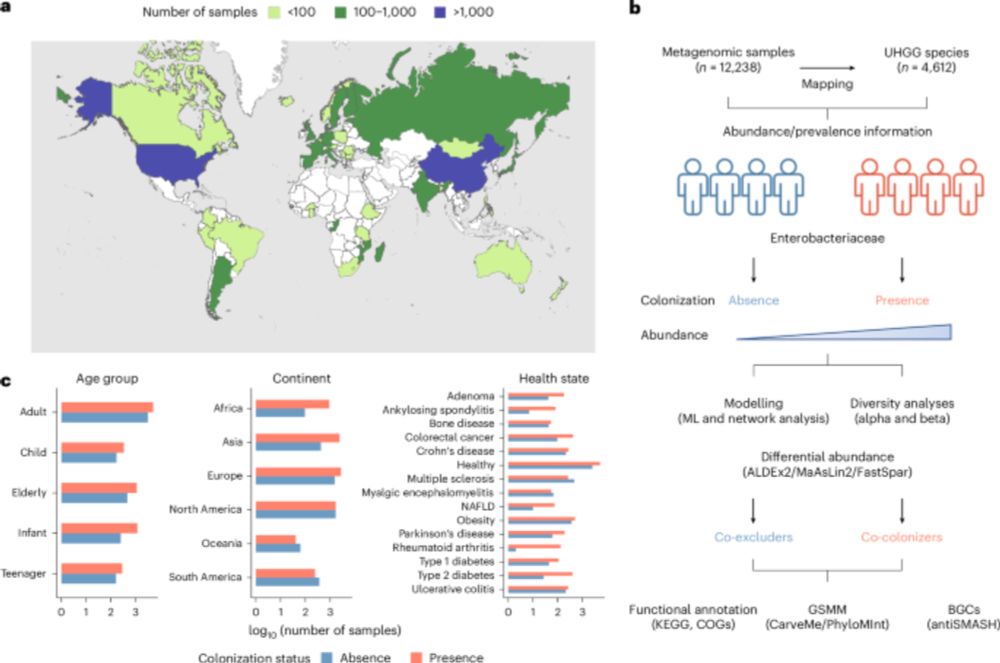
Ecological dynamics of Enterobacteriaceae in the human gut microbiome across global populations - Nature Microbiology
Assessing more than 12,000 metagenomic samples from across the world using computational approaches, the authors determined interactions between species that co-colonize or co-exclude Enterobacteriace...
www.nature.com
January 10, 2025 at 10:50 AM
Interested in the ecological dynamics of Enterobacteriaceae across populations? Check out our new study 🧬
Reposted by Kiran R. Patil
You want to learn about microbiology from a fantastic lineup of speakers on a beautiful Greek island? PhD students apply now for the @EMBO | @FEBSnews Lecture Course The New Microbiology!
Registration: 1 Apr 2025
Course: 03 – 11 Sep 2025 | Spetses, Greece
meetings.embo.org/event/25-new...
Registration: 1 Apr 2025
Course: 03 – 11 Sep 2025 | Spetses, Greece
meetings.embo.org/event/25-new...
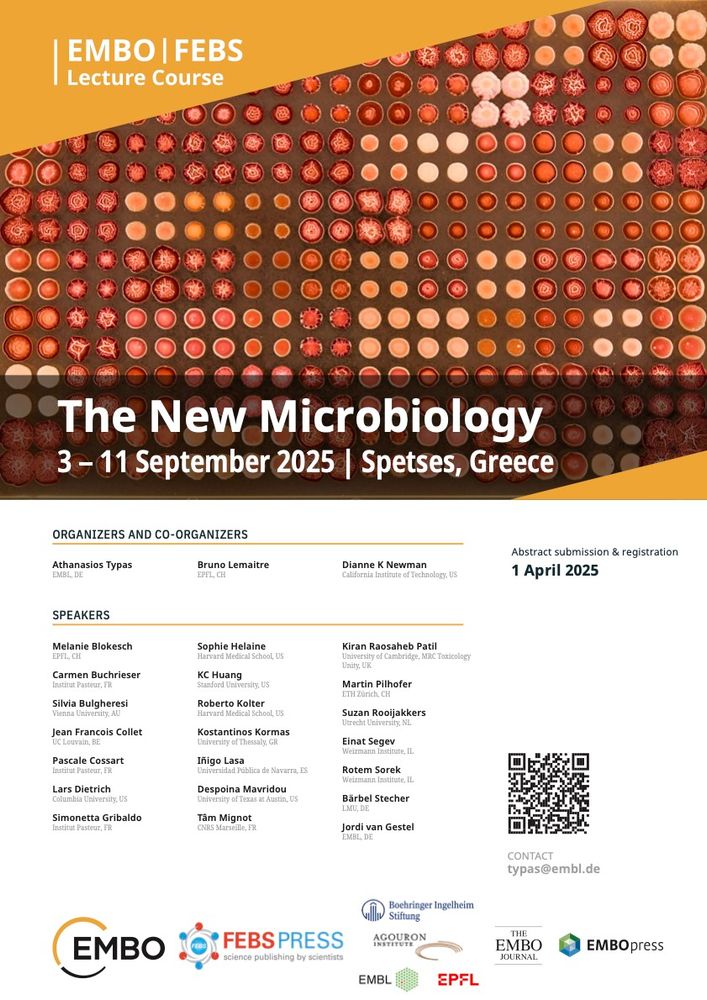
December 16, 2024 at 8:43 AM
You want to learn about microbiology from a fantastic lineup of speakers on a beautiful Greek island? PhD students apply now for the @EMBO | @FEBSnews Lecture Course The New Microbiology!
Registration: 1 Apr 2025
Course: 03 – 11 Sep 2025 | Spetses, Greece
meetings.embo.org/event/25-new...
Registration: 1 Apr 2025
Course: 03 – 11 Sep 2025 | Spetses, Greece
meetings.embo.org/event/25-new...

